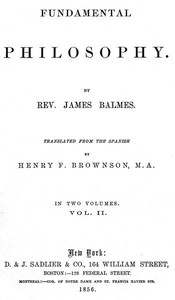Fundamental Philosophy, Vol. 2 (of 2) by Jaime Luciano Balmes
"Fundamental Philosophy, Vol. 2 (of 2)" by Jaime Luciano Balmes is a philosophical treatise written in the mid-19th century. This volume continues exploring the nature of knowledge, focusing on ideas, intellectual acts, and the foundational principles of philosophy. Balmes critiques various philosophical systems, particularly the ideas of Condillac and Kant, addressing the relationships between sensation, intuition, and reasoning. At the start of the text, the author makes a critical examination of the
transition from sensations to ideas, emphasizing that while sensations are essential to our understanding, they cannot fully account for the complexity of our cognitive processes. He discusses the implications of different philosophical perspectives on ideas, reflecting particularly on Condillac's notion that all intellectual activity is derived from sensations. Balmes argues for the necessity of recognizing a distinct intellectual activity that transcends mere sensory experiences. He thus lays the groundwork for a deeper inquiry into the nature of understanding and knowledge, challenging simplifications found in previous philosophical discourses. (This is an automatically generated summary.)
Read or download for free
| How to read | Url | Size | |||
|---|---|---|---|---|---|
| Read now! | https://www.gutenberg.org/ebooks/49244.html.images | 1.1 MB | |||
| EPUB3 (E-readers incl. Send-to-Kindle) | https://www.gutenberg.org/ebooks/49244.epub3.images | 537 kB | |||
| EPUB (older E-readers) | https://www.gutenberg.org/ebooks/49244.epub.images | 538 kB | |||
| EPUB (no images, older E-readers) | https://www.gutenberg.org/ebooks/49244.epub.noimages | 535 kB | |||
| Kindle | https://www.gutenberg.org/ebooks/49244.kf8.images | 751 kB | |||
| older Kindles | https://www.gutenberg.org/ebooks/49244.kindle.images | 600 kB | |||
| Plain Text UTF-8 | https://www.gutenberg.org/ebooks/49244.txt.utf-8 | 983 kB | |||
| Download HTML (zip) | https://www.gutenberg.org/cache/epub/49244/pg49244-h.zip | 360 kB | |||
| There may be more files related to this item. | |||||
Similar Books
About this eBook
| Author | Balmes, Jaime Luciano, 1810-1848 |
|---|---|
| Translator | Brownson, Henry F. (Henry Francis), 1835-1913 |
| Title | Fundamental Philosophy, Vol. 2 (of 2) |
| Credits |
Produced by Josep Cols Canals, Les Galloway and the Online Distributed Proofreading Team at http://www.pgdp.net (This file was produced from images generously made available by The Internet Archive/American Libraries.) |
| Reading Level | Reading ease score: 51.3 (10th to 12th grade). Somewhat difficult to read. |
| Language | English |
| LoC Class | B: Philosophy, Psychology, Religion |
| Subject | Philosophy, Spanish |
| Category | Text |
| EBook-No. | 49244 |
| Release Date | Jun 20, 2015 |
| Copyright Status | Public domain in the USA. |
| Downloads | 257 downloads in the last 30 days. |
| Project Gutenberg eBooks are always free! | |

